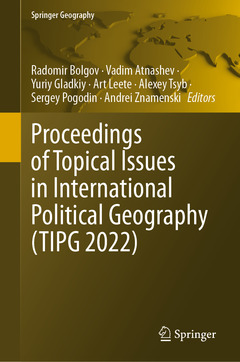Proceedings of Topical Issues in International Political Geography (TIPG 2022), 1st ed. 2024 Springer Geography Series
Coordonnateurs : Bolgov Radomir, Atnashev Vadim, Gladkiy Yury, Leete Art, Tsyb Alexey, Pogodin Sergey, Znamenski Andrei

This proceedings book provides selections from the 2022 Topical Issues in International Political Geography (TIPG) meeting. It addresses the main issues of contemporary political geography and international relations, providing a platform for discussion and collaboration of experts primarily in the fields of Political Geography, Geopolitics, and International Relations. Participants from all over the world consider the controversies and challenges posed by globalization, focusing, in particular, on the ideologies of globalization and regionalism, migration crises, prevention of ethnic conflicts, and measures to promote sustainable development. The content of the book will be interesting to experts, academics, and students in these communities.
Radomir Bolgov. Associate professor at the School of International Relations, St. Petersburg State University, Russia. His current studies focus on the Internet public discourse and digital policies in post-Soviet countries. Program Committee member of the International Conference “Internet and Modern Society” (IMS), International Conference on Theory and Practice of Electronic Governance (ICEGOV), etc. Editor of the journal “Vestnik of Saint Petersburg University. International Relations”.
Vadim Atnashev. Associate Professor, School of International Relations, St. Petersburg State University, Russia. Research interests: Ethnic and Political Conflicts, International law, Human rights, Eastern countries, Countering Extremism and Terrorism. Editor of the Proceedings of International Conference “Topical Issues of International Political Geography” (Springer Geography).
Yury Gladkiy. Professor, Chair of the Department of Economic Geography, Herzen State Pedagogical University of Russia. Corresponding Member for the Department of Professional Education at Russian Academy of Education. His research interests include humanitarian geography, regional economics, social ecology, and political geography. The author of school and university textbooks on humanitarian geography, regional studies, regional politics.
Art Leete. Professor of Ethnology, Institute of Cultural Research, Faculty of Arts and Humanities at University of Tartu, Estonia. His research interests are hunting stories, belief narratives of the Russian Orthodox and Protestants, oral history narratives. He is an Editor-in-Chief of the Journal of Ethnology and Folkloristics. Member of expert commission of historical sacred places, National Heritage Board, Estonian Ministry of Culture. Vice Chairman of the Society of Friends of the Estonian National Museum. Member of the advisory committee for the journal "Anthropology and Archeology of Eurasia". Member of IASSA (International Arctic Social ScienProvides select papers from the 2022 Topical Issues in International Political Geography (TIPG) meeting
Addresses the main issues of contemporary political geography and international relations
Provides a platform for discussion and collaboration in political geography, geopolitics, and international relations
Date de parution : 04-2024
Ouvrage de 583 p.
15.5x23.5 cm



